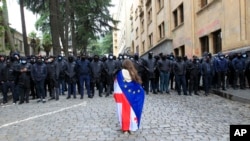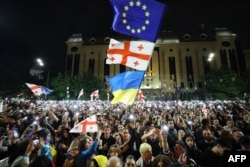Two figures dressed in black and with their faces covered are caught on security camera vandalizing the Media Development Foundation office in the Georgian capital Tbilisi.
The video, taken in the early hours of May 9, shows the individuals putting up posters that falsely claim the nongovernmental organization’s executive director, Tamar Kintsurashvili, is a foreign agent.
Kintsurashvili told VOA the attack didn’t come as a big surprise. The goal is “to present us as enemies of this country,” she said.
The vandalism came amid large-scale protests in Georgia over a “foreign agent” law that passed its third and final reading in parliament Tuesday.
WATCH: Georgia riled by new protests after parliament passes ‘foreign agent’ law
If enacted, the law will require nonprofits and news outlets that receive more than 20% of their funding from abroad to register as “organizations pursuing the interests of a foreign power.” They would also be required to submit detailed annual financial accounts. Groups that don’t comply would face fines.
Kintsurashvili’s organization, the Media Development Foundation, receives some foreign funding to support its work. But, said Kintsurashvili, “Being labeled as foreign agent undermines trust in our activities.”
Last week, hundreds of critics of the law — including around 30 journalists who covered the protests — received threatening phone calls, according to media reports and watchdogs. Numerous offices faced similar vandalism to the Media Development Foundation, and at least six opposition politicians and activists were beaten.
Kintsurashvili worries the harassment will become more common in Georgia now that the law’s enactment appears imminent.
“The purpose of this legislation is not transparency,” she said. “They want to silence unwanted voices, critical voices,” she continued, referring to the government.
Georgia’s Washington embassy did not respond to VOA’s email requesting comment. As of publication, a VOA request for comment sent Friday via the web portal for the prime minister, who is part of the ruling Georgian Dream party, has received no response.
President Salome Zourabichvili said she would veto the bill, but the Georgian Dream party — which reintroduced the law last month after protests prompted its withdrawal last year — controls a big enough majority to override her.
The law’s supporters say it will help bolster transparency and protect Georgian sovereignty. Its opponents say it will be used to silence and intimidate critics of the government.
“It’s not just about supporting Georgia. It’s about supporting democracy,” said Mamuka Andguladze, chair of the Media Advocacy Coalition group in Tbilisi.
Nika Gvaramia, a former journalist and the founder of the opposition Ahali political party, told VOA he believes Georgian Dream may use the foreign agent law to try to influence the October elections in its favor.
Others say the law could also harm Georgia’s bid to join the European Union, which the majority of Georgians support.
Dubbed the “Russian law” for its resemblance to a similar piece of legislation that the Kremlin has used for years to stamp out dissent, critics worry the law bodes poorly for Georgia’s democratic future and risks pushing Tbilisi squarely into Moscow’s hold.
“This law will be used to implement some Soviet-style repression in Georgia, and to target critical voices,” said Eto Buziashvili, a research associate at the Atlantic Council’s Digital Forensic Research Lab. Based in Tbilisi, Buziashvili researches propaganda from Russia and the South Caucasus region.
Buziashvili and other analysts have documented a barrage of Russian propaganda about the bill.
“We’re seeing a lot of other overlap between the government’s arguments about why the bill is needed and what is being said in Russian and pro-Russian sources,” Gulnoza Said, CPJ’s Europe and Central Asia program coordinator, told VOA.
One of the primary narratives is that the Tbilisi protests were organized by the West.
“The idea that the West is funding and coordinating these protests is something that’s being shared pretty explicitly by Russian channels,” said Kyle Walter, who heads global research at Logically, a British tech startup that fights disinformation.
Other propaganda narratives attempt to distance the Georgian law from its Russian counterpart by falsely claiming the Georgian one is similar to the U.S. Foreign Agents Registration Act. Another false narrative depicts the law as necessary to stop the West from coercing Georgia into going to war with Russia as a second front of the war in Ukraine.
Russia’s Washington embassy did not reply to VOA’s email requesting comment.
Many, if not all, of these narratives are not necessarily new, according to Walter and Buziashvili. But they do highlight the Kremlin’s apparent support for Georgia’s foreign agent law.
The narratives also underscore what’s at stake for a country that was once lauded as a bastion of democracy among former Soviet states but in recent years has found itself increasingly wobbling between the West and the Kremlin.
“It’s another stage of Russia’s conflict with the West more broadly,” Walter said.
Journalists and political leaders who spoke with VOA, however, said most Georgians can see through the propaganda.
“They recognize Russian propaganda very easily. For us, it’s at first sight,” said Eka Kvesitadze, a journalist at the pro-opposition Georgian broadcaster Mtavari Arkhi.







